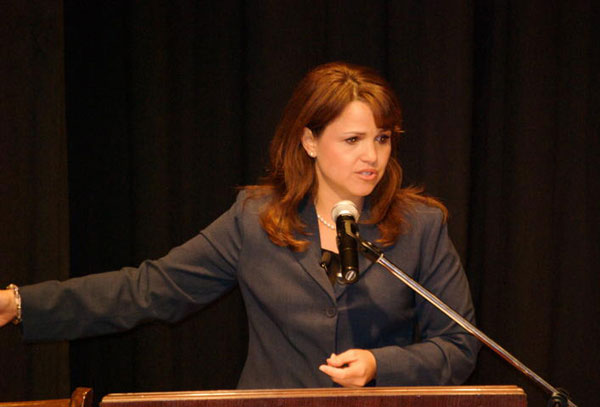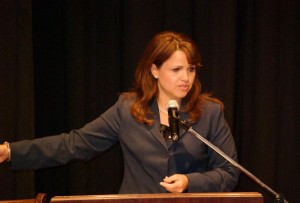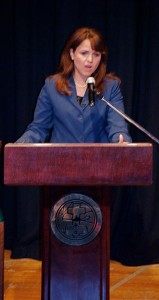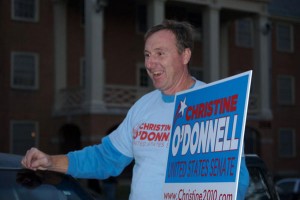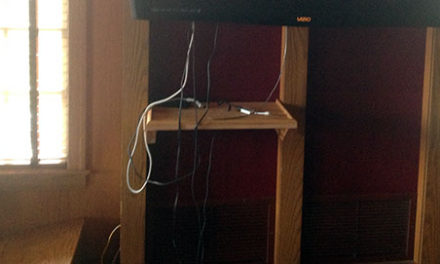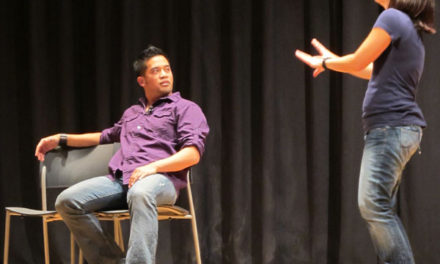By Kim Manahan (Whetstone editor)
Delaware Senate candidate Christine O’Donnell came to Wesley College Friday night and spoke to about 100 students, faculty and members of the Dover community, impressing some and alienating others as she talked about unemployment, the economy and health care.
Advertised as an open forum and sponsored by Wesley’s Student Government Association, O’Donnell was introduced by SGA president Tanner Polce. Vice President Bryan Zarou posed his own questions, as well as those he had gathered from the audience.
O’Donnell said she was impressed to see so many students out on a Friday night, although many Dover locals sat in the crowd and advocated for her outside.
“I’m here to ask for your vote,†she said.
She told the audience that she had a prepared speech, but preferred to speak from her heart, and spoke mostly about the economy, debt and unemployment.
“I don’t believe the government has the answers,†she said.
America is facing the largest tax increase next year, she said. “My opponent wants to raise taxes on the top 2 percent [of earners].â€
O’Donnell believes in spurring the economy, but only through the private sector.
“Can someone define the American dream?†she asked audience members.
One responded, “The pursuit of happiness.†Another cried, “To own your own home.â€
O’Donnell said that both political parties are at fault for how the economy is now.
“I still believe America’s best dreams lie ahead,†she said. “They lost their way on constitutional privileges.â€
When Clinton raised taxes, a recession followed, O’Donnell said, despite the fact that Clinton’s second term during the late 1990s saw a federal surplus and a booming economy.
She blamed President Obama for increasing the deficit and debt.
“We can’t afford Obamacare,†O’Donnell said, referring to the health care plan passed by Congress this year. “We need to cut taxes and spending.â€
O’Donnell said she got involved in politics during college.
“They were paying $75 to pass out literature at the polls,†she said. Plus it was an excused absence from class.
“It was then that I found out that I have opinions,†she said.
She encouraged students to get involved politically.
When the forum began, Zarou told O’Donnell that the questions would be strictly on issues.
“We ask that you limit attacks since your opponent is not here,â€Â Zarou told her.
The first question dealt with public transportation in Delaware.
She said it was a state issue. “I believe in limited federal government support for public transportation,†she said.
Zarou read another student question that centered on the legalization of marijuana, which Californians will be voting on next month.
“If Delaware’s next, that’s up to Governor Markell,†she said, referring to the First State’s governor. She refused to give her opinion.
Another question tackled the constitutional issue of the separation of church and state, which she and Coons had argued about during their Widener debate earlier last week.
“Let me clarify,†she said she told Coons. “You’re saying the separation of church and state is in the First Amendment?â€
At Wesley, O’Donnell said she had asked Coons whether the phrase actually appeared in the Constitution.
She said at Wesley, however, that what is taught in local schools – including creationism or Intelligent Design – is up to local school boards, not the federal government, making the First Amendment from her point of view irrelevant.
O’Donnell often went off topic.
“I just want to stick with the actual question,†Zarou said more than once. “Please stick to the question.â€
In 2006, an article in the News Journal reported that O’Donnell said she believed homosexuals have an identity disorder.
That was the next student question.
“I think it’s irrelevant,†O’Donnell said. “Sometimes I think my words are taken out of context.â€
She changed the subject briefly to the economy, and then reiterated that she is Catholic.
“I support domestic partnership,†she said. “I support one man and one woman, because it puts the first and tenth amendment against each other.â€**
The campaign should be about issues, she said.
But part of the issues of this Senate race has been about the campaign itself.
During the Widener debate, a panelist had asked O’Donnell if any of her campaign money was still paying a portion of her rent in her Greenville town house.
“We still use it as an office,†she said. “We house many of our volunteers, and those funds go towards it.â€
This issue, however, has been a mischaracterization of her campaign, she said.
“None of my rent is paid [by campaign funds],†she said Friday night. “Coons twists the facts.â€
The staff uses the townhouse to live in, she said.
Afterward, Zarou praised her as “a real person, not a tailored rich guy, but he also said she dodged questions. “And she rambled on and on.â€
Donald Goldsborough of Smyrna sat in the parking lot in front of Gooding Hall with a giant sign supporting O’Donnell in a beat-up pickup truck.
“I have never campaigned for anyone before,†he said. “I support the Tea Party.â€
Like O’Donnell stated at the recent debate at Widener University, Goldsborough also supports English being made the official language of the United States.
A main reason he supports O’Donnell is because he is against the death tax. I want to pass my farm on to my son, Goldsborough said.
“I like her so far,†said freshman Kaitlyn DeVine. “I like the way she goes in with a strong opinion.â€
Her father, John Devine, feels O’Donnell is as eligible as anyone else.â€
Travis Ragland, a sophomore, does not agree.
“I don’t think her credentials are what they should be,†he said.
“She doesn’t belong in the Senate,†said senior political science major Merete Aanes. “She seems way less smart than Coons, and I hope she does not win.â€
Freshmen Mike Evonshon sees things the same way.
“I’m not in support of her,†he said. “I don’t think she’s a good candidate.â€
________________________________________
First Amendment: Congress shall make no law respecting an establishment of religion, or prohibiting the free exercise thereof; or abridging the freedom of speech, or of the press; or the right of the people peaceably to assemble, and to petition the Government for a redress of grievances.
Tenth Amendment: The powers not delegated to the United States by the Constitution, nor prohibited by it to the States, are reserved to the States respectively, or to the people.

